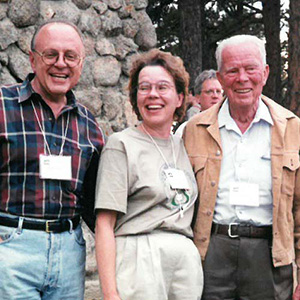 The audience at the 2017 Natural Hazards Workshop raise their hands to indicate they entered the field to help people. ©Zoe Welz, 2017.
The audience at the 2017 Natural Hazards Workshop raise their hands to indicate they entered the field to help people. ©Zoe Welz, 2017.
For the past 43 years, the Natural Hazards Center team has had the honor of organizing the Annual Natural Hazards Research and Applications Workshop. We recently released the theme and the call for ideas for the 2018 Workshop.
In this Director's Corner post, I want to share some of the thinking that informed this year's theme of Twenty Questions: Looking for Answers to Reduce Disaster Risk.
First, though, a few words about the Natural Hazards Workshop. At its heart, this meeting has always been about bringing together people from the broader hazards community who might not otherwise get to know one another. We realize that it is in this space that a special exchange of ideas can and does occur.
In a field that is often dominated by the need to act quickly-to save lives, to defend property, to preserve fragile ecosystems-the Workshop is a place to take stock of the state of hazards and disaster research, practice, and policy.
 Dennis Mileti, Mary Fran Myers, and Gilbert White at a Natural Hazards Workshop barbecue on Flagstaff Mountain, near Boulder. ©Diane Smith, 1999.
Dennis Mileti, Mary Fran Myers, and Gilbert White at a Natural Hazards Workshop barbecue on Flagstaff Mountain, near Boulder. ©Diane Smith, 1999.
The 2018 theme was written with this sense of urgency in mind, as well as a simultaneous desire for us to slow down for moments of focused reflection. We are coming off a year of record-shattering disaster losses where 25 million Americans were directly affected by major hurricanes, wildfires, severe storms, and other extreme events. Millions more have experienced the collateral consequences of these calamities. Thousands of first responders from more than 30 federal government agencies and departments were called on to take immediate life-saving and life-sustaining action. Many of these individuals will remain in the field for months or even years to come, as they attempt to help communities move toward that elusive state we refer to as recovery. And while we are still only two months into 2018, the nation has already been rocked by a series of events from false warnings of nuclear threat in Hawaii to flooding across the Midwest.
With this acceleration and expansion of disaster losses, I am deeply concerned that we are moving toward a permanent state of crisis response. How will we reduce disaster risk—and by that I mean lessening hazard exposure and social vulnerability while increasing individual and collective capacity—if we are repeatedly responding to one catastrophe after another?
That is a question that I carry with me everywhere. It is constantly on my mind and in my heart.
During this past year, I've talked to members of our hazards and disaster community about the questions that they are grappling with each and every day. This year's Workshop theme was written around those big questions, and it was crafted with a strong hope that, through the process of bringing our community together, we might make some progress in answering those questions and acting accordingly in response.
We are living in a historic moment where divisions abound and the gulf between the powerful and the disenfranchised widens by the minute. But when I look out at the world, I do not only see those divides and their grave consequences. I see what binds us together, including the fact that we all share this one planet. It is a moderate-sized place that well over seven billion of us call home—and it is a world that seems to be growing more turbulent by the day. Our mutual recognition of that risk and a shared commitment to making communities safer for everyone might just set us on a new course for a more equitable and sustainable future.
How do we get there? That is a question that none of us can answer in isolation. It's my hope, however, that the Twenty Questions posed by the hazards and disaster community can help us begin the journey to find solutions. Thank you for adding your voice to the conversation. We need your minds and your efforts more than ever. We are all in this together after all.
Please take care of yourself and others.
Lori Peek, Director
Natural Hazards Center